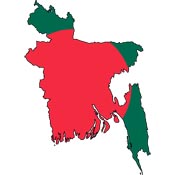Bangladesh cracks down on rampant corporate corruption
 Dhaka, Apr. 2 : The Government of Bangladesh has taken its first step towards tackling the menace of corporate corruption, which exists on a large scale in the country.
Dhaka, Apr. 2 : The Government of Bangladesh has taken its first step towards tackling the menace of corporate corruption, which exists on a large scale in the country.
Corporate corruption is a force that is as destructive as the cyclones that have ravaged the country's coastline in the past.
Last week, Bangladesh''s newly elected government took its first high-profile swipe at the problem.
According to the Christian Science Monitor, Arafat "Koko" Rahman, the son of former Prime Minister Khaleda Zia and a prominent businessman, was formally charged with laundering nearly two million dollars in kickbacks, including 180,000 dollars from Siemens Corporation, the German electronics giant.
Rahman and his brother Tarique, although allegedly at the center of many corrupt deals in Bangladesh, were considered untouchable between 2001 and 2006, when their mother held office.
The charges against Arafat Rahman are the first involving foreign bribery and could result in a jail sentence of seven years if he is found guilty, the CSM reports.
The case highlights a determined move by Bangladesh''s government to root out corruption at the highest levels, while tracing its sources through financial institutions and multinational companies abroad.
"This issue of foreign companies using bribery to get contracts has been a kind of public knowledge," says Iftekhar Zaman, the executive director of Transparency International Bangladesh, the Bangladesh chapter of the Berlin based anti-corruption watchdog.
The case against Siemens portrays a typical pattern for graft here. Between 2004 and 2006, as mobile phone use soared in Bangladesh, Siemens was pushing for a 40 million dollars telecommunications contract with the Bangladeshi government.
A payment of 180,000 dollars was arranged and sent to Arafat Rahman''s Singapore bank account, according to public statements made by Siemens as well as the case filed by Bangladesh''s Anti-Corruption Commission (ACC), which is tasked with investigating graft and preparing charges.
The CSM report says that the problem is not specific to Bangladesh. Corporate foreign bribery is a thriving global business, according to studies by the World Bank, which estimates that foreign companies annually pay a trillion dollars in kickbacks to corrupt government officials.
The victims of such bribery are not only the companies that lose out. There is growing awareness that bribery can have a direct, destabilizing impact on developing countries.
"Many of the [multinational companies] don''t care who they''re giving money to. They don''t try to find out what effect it will have on the life of ordinary people," contends Sultana Kamal, the director of Ain O Salish Kendra, a leading human rights group based in Dhaka. "They should be very careful about it."
Amid growing public awareness and public outrage, Bangladesh''s government has in recent years acted with force. In the past two years, the ACC has launched hundreds of investigations into some of the most prominent ministers and businessmen in the country - including the sons of Khaleda Zia. Both brothers were arrested in 2007. They are currently on bail as more charges are framed against them. (ANI)